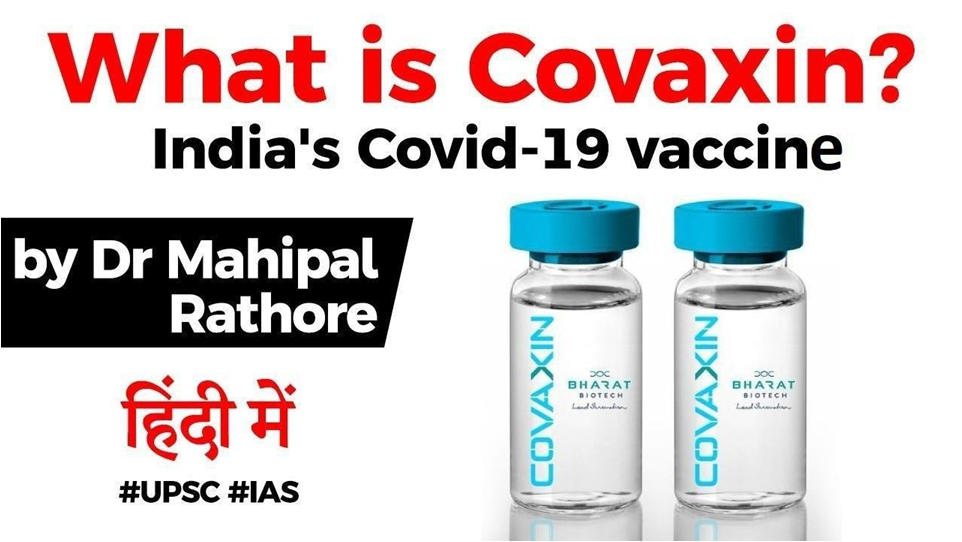Table of Contents
The News
- India’s drug regulator, the Central Drugs Standard Control Organisation, has allowed to conduct human clinical trials for ‘Covaxin
- It the first indigenousCovid-19 vaccine candidate to receive this approval.
- These trials are scheduled to start across India in July.


Who has developed the vaccine?
- Bharat Biotech India (BBIL)
- National Institute of Virology (NIV),Pune
- NIV (under ICMR) isolated a strain of the virus from an asymptomatic Covid-19 patient and transferred it to BBIL.
Live-attenuated vaccines
- Weakened (or attenuated) form of the germ that causes a disease.
- Because these vaccines are so similar to the natural infection that they help prevent, they create a strong and long-lasting immune response.
- Just 1 or 2 doses of most live vaccines can give you a lifetime of protection against a germ and the disease it causes.
- Live vaccines are used to protect against:
- Measles, mumps, rubella (MMR combined vaccine)
- Rotavirus
- Smallpox
- Chickenpox
- Yellow fever
Inactivated vaccines
- Inactivated vaccines use the killed version of the germ that causes a disease.
- Inactivated vaccines usually don’t provide immunity (protection) that’s as strong as live vaccines – booster shots.
- Inactivated vaccines usually have a better safety record.
- Inactivated vaccines are used to protect against:
- Hepatitis A
- Flu (shot only)
- Polio (shot only)
- Rabies
- Other Indian firms engaged in the development of Covid-19 vaccines
- Zydus Cadila
- Serum Institute of India
- Panacea Biotec

- The AZD1222 (formerly known as ChAdOx1 nCoV-19) vaccination, developed by researchers at the University’s Jenner Institute, and manufactured by AstraZeneca, has already begun Phase III human trials.

- WHO list
Vaccine Development
- The general stages of the development cycle of a vaccine are
- Exploratory stage
- Pre-clinical stage
- Clinical development
- Regulatory review and approval
- Manufacturing
- Quality control
Clinical development
- Clinical development is a three-phase process.
- New drugs must pass through these three phases of clinical trials before being deemed safe and effective for widespread use.
- Assuming the initial tests go well, it may be 12 to 18 months before this Coronavirus vaccine is ready for public use.

Phase 1
- Phase 1 trials examine a small group of people, typically between 20 and 80 individuals, who receive different doses of an experimental treatment.
- Over the course of several months, researchers monitor how each volunteer metabolizes the given treatment and what common side effects emerge in response to different doses.
Phase 2
- Phase 2 trials typically examine several hundred people and monitor participants for periods of from several months to two years.
- Primarily, Phase 2 trials serve as a secondary measure of safety and help researchers to refine the dosing of a particular medication.
- At this stage, researchers select participants with characteristics, such as age and physical health, that match those of the people who the vaccine is being developed for.
- For example, although anyone can contract COVID-19, those of advanced age and those with chronic conditions are more likely to develop severe symptoms, so this could be a consideration in Phase 2 trials.
Phase 3
- Phase 3 trials typically follow 300 to 3,000 volunteers over the course of one to four years.
- With a larger group of people, researchers can take note of unusual side effects of the drug, and by lengthening the study period, they can catch long-term side effects as they emerge.
- Phase 3 trials must demonstrate that a given drug provides the medical benefits it’s intended to.
Phase 4
- After approval from the regulator, the firm has to continue monitoring the use of its vaccine on patients and submit post-marketing surveillance details, which checks for any long-term unintended adverse effects of the product.
Latest Burning Issues | Free PDF






















 WhatsApp
WhatsApp